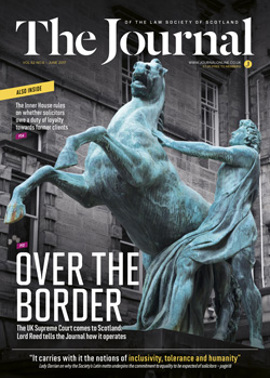Galo and fair trial: which way for Scotland?
Disabled people will remember December 2016 well. Judgment in the seminal case of Galo v Bombardier Aerospace UK [2016] NICA 25 was given by Morgan LCJ, Gillen LJ and Wetherup LJ and is now to be taken as expressing the law in Northern Ireland – disabled people are to be protected in domestic law against breaches of their rights under article 13 of the UN Convention on the Rights of Persons with Disability, in that they can expect effective access to justice on an equal basis with others including provision of appropriate procedural adjustments by the courts and other bodies involved in their cases in order to facilitate their role as direct and indirect participants in all legal proceedings.
Courts and tribunals can have regard to guidance published in the Equal Treatment Bench Book (“ETBB”), published by the Judicial College, considering how best to accommodate disabled people in courts or tribunal process.
The ETBB points out the need for evidence either from the disabled person themselves or, in an appropriate case, expert evidence before the judge can consider reasonable adjustments to the court process. In Galo the Court of Appeal recognised the benefits of the ETBB’s “ground rules hearing” – a preliminary hearing that the court or tribunal will adopt tailored to circumstances of the particular litigant. It is a groundbreaking case as anyone who has dealt with the needs of the disabled litigants in criminal, civil, family, employment or welfare benefits courts will attest to.
But the judgment in Galo did more than that. “We have formed the clear impression that the ETBB does not appear to be part of the culture of these hearings. That is a circumstance which must fundamentally change with a structural correction to ensure that this situation does not recur.” The problem, so the Lords Justices of Northern Ireland said, “highlights, perhaps, the need for there to be better training of both judiciary and the legal profession in the needs of the disabled”.
Such a warning about the conduct of judges and legal practitioners in Northern Ireland could be expected to find resonance with the Court of Appeal in England & Wales – but clearly the fact that a ground rules hearing is not routinely offered to disabled people does not appear to trouble the Lords Justices. In two “Galo”-like cases they have refused even leave to appeal to the Court of Appeal. One wonders what is going on in the minds of the judges if they will not hear these cases in full knowledge that their brother judges had made such comments about the judiciary and legal practitioners in the parallel jurisdiction of Northern Ireland.
It is notable that the Galo judgment was taken up by the Equality & Human Rights Commission in its report to the International Commission on Rights of People with Disabilities (sent up by UNCRPD itself) over the UK’s compliance with the UNCRPD. It pointed out that the court in Northern Ireland had formed the clear impression that the ETBB did not form a part of the culture of these hearings. Clearly the committee was itself concerned, and in its questions to the UK Government, of 20 April 2017, it asked what steps the Government had taken to access justice through speedy, effective and efficient procedures, to ensure that no costs are incurred by disabled people that would not be incurred by others, and what training the judiciary had over the provision of reasonable accommodation to disabled people for accessing the justice system. It will be interesting how the Government responds to such requests for information.
It matters for Scottish disabled people which way the courts within the Scottish jurisdiction will interpret the law over this area. Is the Equal Treatment Bench Book going to be seen as an effective resource for judges determining disabled people's rights to a fair hearing, or just a bit of leather bound show to impress the international committee but failing to impact the day-to-day culture of Scottish courts?
Places are limited so please book early to avoid disappointment.
In this issue
- Neutrality policies in commercial companies
- Court IT: the young lawyers' view
- Human rights: answering to the UN
- Galo and fair trial: which way for Scotland?
- Secondary victims in clinical negligence
- Reading for pleasure
- Opinion: Alan W Robertson
- Book reviews
- Profile
- President's column
- Twin tracks to completion
- People on the move
- Court of the nations
- Second time around
- How to avoid a summer tax scorcher
- Humani nihil alienum: a call to equality
- Sheriff commercial procedure: count 10
- Taking a pay cut: fair to refuse?
- Fine to park here?
- Enter the Bowen reforms
- Home grown
- Limited partnerships: a new breed
- Salvesen fallout: the latest round
- Gambling in football – the Scottish perspective
- Scottish Solicitors' Discipline Tribunal
- Changing sides
- Business drivers
- CCBE comes to Edinburgh
- "Find a solicitor" gets an upgrade
- Law reform roundup
- Thoughts on a frenetic year
- Check those bank instructions
- Fraud alert – ongoing bank frauds identified
- AML: sizing up the risk
- Master Policy Renewal: what you need to know
- Without prejudice
- What's the measure of a ruler?
- Ask Ash






